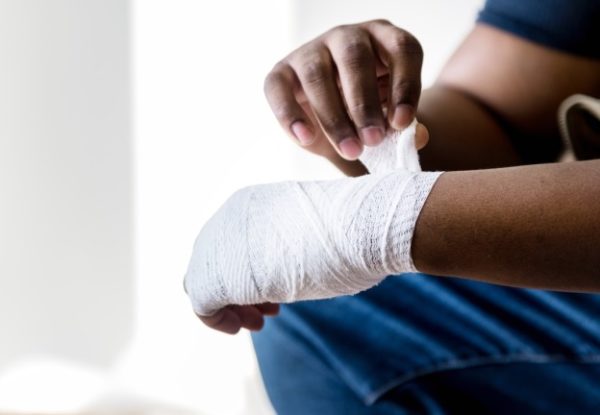Home Tags Posts tagged with "injuries"
injuries
Experts report that there were 2.8 reported injuries per 100 full-time workers in the United States in 2018.
Many of these would have been minor, requiring little or no treatment. However, many more would have been serious enough to warrant ongoing care.
In these cases, workers should be entitled to treatment from workers’ comp doctors. However, not every doctor treats workers’ compensation patients.
Read on to learn more about what doctors accept workers’ compensation, and how to find them.
What Is Workers’ Compensation?
Workers’ compensation protects employees when they suffer illnesses or injuries as a result of their activities at work.
It covers a broad range of conditions, including almost any physical injury. The most common injuries are overexertion injuries, slip-related injuries, and fall-related injuries.
Workers comp may also cover mental illnesses, although causation here is more difficult to prove.
The employer is the party who is liable for payment. However, workers’ comp insurance is widely available to provide cover here, and is actually legally required in every state except Texas.
The payment provides for medical treatment as well as lost earnings.
How to Find Workers’ Comp Doctors
As mentioned above, not every doctor deals with workers’ compensation cases. To get ongoing treatment for a condition you developed at work, you will have to find a specialist Workers’ Compensation Doctor.
These are doctors that the state government approves as providers of workers’ compensation care. You may have to find such a doctor yourself, but your employer might direct you to one in some cases.
You should note that you don’t need to go to a workers’ comp provider for your initial assessment. Your usual healthcare provider (or an emergency room doctor) is acceptable for this.
While ongoing care is provided for by the workers’ compensation scheme, there are limits to your entitlements. For instance, you will only be allowed a certain number of physiotherapy or massage therapy visits under your workers’ comp plan.
What If My Employer Won’t Pay?
As noted above, workers’ compensation insurance is generally mandatory. However, many employers will still try to escape liability in order to protect their low insurance premiums.
The easiest way for an employer to do this is to attempt to prove that your injury did not arise as a result of your working activities. This is easier in some cases than in others.
For example, if you fall off a height and break your leg at work, it will be impossible for your employer to argue that you weren’t injured at work.
On the other hand, if your injury arose because of repetitive strain, your employer might be able to make a convincing argument that you sustained it due to activities carried out outside the workplace.
Getting the Care You Need
If you’ve suffered an injury, the first thing on your mind will be recovering from it. Workers’ comp doctors can help you take the first step and guide you through the entire process.
Did you find this article useful? If so, be sure to check out some of our others! We post content on a range of topics, including romance, family, and self-improvement.
Have you just suffered an injury at work?
You’re far from alone.
Indeed, there were 5,250 fatalities in 2018 that came from workplace injuries. This startling statistic reveals just how common workplace injuries can be.
Physical, mental and emotional hardship are ubiquitous in the American workforce. The impact of any such ailment on life can be extreme.
Thankfully, financial support in the form of work injuries compensation can be a silver lining to any injury you experience. If you’re going to suffer at the hands of your employer, then you might as well be compensated appropriately.
The trouble is that many people end up receiving far less than they need (or are owed!).
Want to ensure you avoid this fate and get compensated in full?
Keep reading to discover 6 tips for doing exactly that.
1. Gather the Evidence Together
Your bid to maximize compensation often comes down to the evidence you have of the event(s).
You might look at your injuries and assume that’s all the evidence you need! Alas, that won’t hold up in front of a jury. Make sure you gather together everything and anything that might be useful in your case. The more you have, the stronger your case will be.
Oftentimes, that requires being proactive in the early days following an injury or issue.
Photograph the scene where it happened and the injuries you incurred. Hold onto medical reports and doctor’s notes. Seek statements and contact details from people who were there at the time. And so on and so forth.
Do your digging and hand everything over to your attorney. More on this next.
2. Speak to an Attorney
You need a personal injury lawyer to fight in your corner.
Having one by your side throughout this process will be an unparalleled source of support and comfort. After all, legal proceedings can be complex; newbies to the scene can soon get lost in amongst the bureaucracy.
Take the case yourself and you’re in for trouble (assuming you’re not a legal expert).
In worst-case scenarios you might even fail to claim all the damages you’re owed. You might be surprised at how many things your case qualifies for. Lacking this insight, it’s all too easy to leave money on the table.
Injury lawyers will be able to assess your situation and identify exactly what you’re owed.
That’s an obvious boost in your bid to maximize compensatory employer pay-outs.
3. Get Treatment
Medical treatment may or may not have been optional for your particular injury.
Some people have no choice in the matter given the extent of their injuries. In more minor cases, though, people may decide to recover under their own steam.
This is no time for stoicism though! At the end of the day, you’re hurt and need medical intervention. That’s of vital importance for making a full recovery and minimizing your chances of long term struggles.
In the realm of this article, though, it’s also vital to your legal case.
Accessing treatment means you have a medical record of the damages you incurred. The injuries have been assessed, treated, and reported by professionals.
The result is a document that can be taken to the negotiation table as proof of what you’re owed.
4. Think Hard About the First Offer
Your employer is unlikely to want to go to court over the issue.
It’s time-consuming, expensive, and bad publicity. As such, it’s in their interest to try and settle the case outside of court. They’ll make a financial offer in the hope that you’ll take the cash and run.
Of course, it’s up to you what you do here.
Remember, though, that it’s in their interest to save as much cash as possible. Thus, they’ll come out of the gate with an offer of lower cash value. Twist their arm and you could get much more.
The trick here is to demonstrate the strength of your case against them. Show them why it’s insufficient. Then, help them realize how determined you are to get the compensation you deserve.
They might come back with a better offer.
If not, you can fight it out in court and hope for a win.
5. Work Hard on the Case
Everything depends on the strength of your case.
That’s no exaggeration.
To maximize the compensation you get from going to court, you’ll need compelling proof of what happened. Work with a lawyer and proceed in a methodical, calculated way.
Speak with anybody who might strengthen your claims: medical professionals (the more people who can corroborate your claim, the better), experts in the field, and so on. Get your hands on any records that have the same effect, and conduct depositions.
In time you can assemble all the evidence and arguments you need to win in court. Heck, if the case is strong enough you’ll likely be able to get the settlement you deserve outside of it.
6. File Quickly
Don’t wait forever and a day to file your case.
In fact, don’t wait at all! The quicker you do it, the better. A time limit is imposed on filing the case from the moment you suffer the injury.
If that passes, then you may not be able to get any compensation at all. Filing fast is also a clear sign to your employer that you’re coming after them. You get the impetus you need to start pulling your evidence together and demonstrate your intent in the process.
Claim Your Work Injuries Compensation
Workplace injuries happen all the time.
Of course, the severity of cases varies enormously.
One thing that’s for sure, though, is the ubiquity of the physical, mental and emotional struggles that occur at work. If you’ve suffered in this way recently, then there’s a good chance that you’re owed compensation.
Unfortunately, receiving adequate work injuries compensation pay-out is far from guaranteed.
Successfully seeking compensation demands insight into the process. Ignorance is the enemy when it comes to maximizing the amounts of money you’re owed by an employer.
Hopefully, though, this post will prove helpful in securing the cash you deserve.
Want to read more articles like this one? Search ‘compensation’ on the website now.
Have you been injured on the job? If so, you know how difficult it is to trust those inserting themselves into the situation. This is particularly true if you’re a civilian contractor with a Defense Base Act case.
In these cases, the insurance company will send adjusters and nurse case managers, all of whom try to persuade you to say and do certain things, including going along with their own attorney. You best course of action is to dedicate yourself to recovering, stay mum, and educate yourself on the law. That begins with the basics, like the difference between scheduled and unscheduled injuries.
Unscheduled Injuries
Both scheduled and unscheduled injuries are types of permanent disabilities. They are defined in Section 8 of the Defense Base Act.
Unscheduled injuries are also known as non-scheduled injuries. Unscheduled injuries that occur at work often pertain to pain and conditions which affect mobility and basic function. The most common areas which present unscheduled injuries would be the neck and head, back, or shoulder.
Once you have sustained this type of injury, it isn’t all about how many weeks you should be compensated for. Instead, your remaining abilities are assessed to see what your post-injury earning capacity is.
In any DBA claim, the first step is getting as well as possible. All assessments and determinations have to take place after you’ve recovered to the maximum. This post-injury earning capacity is compared to your pre-injury earnings to see if the injury has caused a deficit.
If your earning capacity has been reduced as a result of the accident, injury, or work-related condition, you might be eligible for Permanent Partial Disability (PPD).

Scheduled Injuries
Scheduled injuries are typically disabilities that one would notice by looking at you; they can involve the loss of a digit or limb. However, disabilities that can sometimes be considered “invisible”, like vision or hearing loss, fall under the scheduled injury umbrella as well.
Like unscheduled injuries, the first course of action is to recover to your new best capacity. This is why it’s always important to keep your doctor’s appointments, and follow instructions to the letter, if possible.
But unlike unscheduled injuries, scheduled injuries involve determining how many weeks or months you are eligible for compensation. Once you’ve recuperated, a doctor will figure out what your impairment rating is. This rating is used to figure out your Permanent Partial Disability duration.
Underpayment is rampant among scheduled injuries, so it’s vital that you have the best lawyer to represent your Defense Base Act case. A good attorney will help ensure the insurance company doesn’t underpay you, and can also help you learn more about what else you may be entitled to, such as training that can help you get back to work. They can even team up with you to dispute findings.
These kinds of worker compensation claims can be really tough to navigate, especially when the insurance company has sent so many people your way to throw the case off. With respect to DBA cases, any old worker’s compensation lawyer won’t do – locate a firm that has experience with scheduled and unscheduled injuries.
Terrifying as it may sound, significant numbers of people in the US are still dying from injuries due to unintentional accidents. This means, according to the NCHS there are 30.6 million emergency room visits each and every year, with unintentional death being the fourth most common cause of fatalities. What can be done to curtail this epidemic? Read in to find out more.
Traffic
10.6 of the deaths per 100,000 people are caused by traffic accidents. Of course, we live in a society in which almost everyone requires a car to be able to get to work, get their kids to school, and do the everyday parts of life that are essential. However, it is clear that people are still not taking driving safety seriously enough.
With this in mind, actions that increase the safety of vehicle journeys for passengers, and other road user need to be prioritized. These may include providing more comprehensive drivers Ed, including defensive driving techniques and demonstrating the results of an accident at high impact as a deterrent measure. Government subsidies for vehicles with advanced safety features such as ABS and collision avoidance systems would also be a welcome development.

Picture
Falls
10.0 of the deaths per 100000 people are caused by falls from height. Sadly this is an area in which such fatalities could often be avoided if only the victim were made aware of the safety risk beforehand. That is what an essential part of tackling this particular concerns is educated people in safe practices when working at height both in the home and at work.
However, there is only so much the individual can be held accountable for accidental falls. After all, if they do don’t know there is a risk, they will go ahead with action whether its safe or not.
That is why it is also vital that employers take on their due responsibilities and step up to the mark where safer equipment and signage is concerned.

Picture source
After all, they have a moral and legal duty to preserve the life and well being of their employees while they are performing the task they ask of them. That means professionals like Derrick Law Firm can help victims and their families make a claim against them if they do not live up to these duties. Something that can prevent such tragic accidents happening again.
Poisoning
A shocking 13.2 out of every 100,000 deaths are caused by unintentional poisoning in the US. Sadly many of these deaths are attributed to poisoning by drug use, a problem that has doubled and tripled for men and women respectively, over the last few year.

Picture
Obviously, preventing such deaths is a complicated issue that is not just about preventative education. In fact, it needs to also involve economic and social reform, better higher education opportunities and the provision of rehabilitation and counseling for those that are already using.
In addition, the use of drugs such as Naloxone and the facility to carry them by the police and fire services also has the potential to drastically reduce this figure over the longer term. Something that makes it issues that more people should speak out on.
We are living in a world of rules and regulations. Wherever we go, whatever we do, we need to be accountable for our actions. We are required to conform to different guidelines set before us. Since we are in a law laden world, knowing when to defend our rights is really a must.
In defending us, lawyers definitely can do the work. An attorney, counselor, or solicitor is a licensed professional who advises and represents others with regards to legal matters.
Not all legal matters require hiring an attorney, e.g. you are caught violating traffic rules like speeding. Laws are vast and complicated and knowing when to get and not to get a lawyer will help you save effort, time, and resources.
What are the specific cases when you really need a lawyer?
Crime Involvement
When you are involved in a criminal offense, you should seek a lawyer to represent you. This area of law deals with offenses that interrupt the regulations of a locale, federal governments, or a state. In this kind of law, there are misdemeanors or just small offenses and felonies or belonging to more serious crimes. Get a lawyer as soon as possible to protect your rights or to defend you whether you are guilty or not. Prevention is better than cure, so get one before you land in jail.
Lawsuits
Being a lay man, it will be a struggle to beat deadlines and codes of behavior especially for filling and filing legal documents. You certainly need an assistance of a lawyer for this one. In suing and being sued, the penalties of a damage may result in the loss of a big deal of money or property. To avoid this, you need to get an experienced counselor.
Injuries and Damages
Whether you are the one who is injured or the one who injured, get a seasoned attorney. You are not aware of the laws of compensation rates for damages, so getting someone who knows will give you a breather. This way, you will be sure that every money that comes out of your pocket for paying the actual damages is a reasonable one.
Divorce, Wills, and Rights
Complicated cases of divorce, wills, and rights where issues of savings, support, property, and investments are quite a feat. Hiring an able attorney to untangle the mess is a must. You need all the help you can get in terms of legal matters since these kinds of cases are going to be emotionally taxing.
Declaring Bankruptcy
You cannot file for bankruptcy without a lawyer so you really need one. Never try to navigate all of the legal requirements alone. Get a competitive lawyer. Having an attorney by your side will help you in making important decisions about your business and what you will do if you have to close it down.
Takeaway
Spare yourself from all the problems that could come your way by tapping a lawyer. There are a lot of Corpus Christi lawyers out there who are ready to extend legal assistance. A good legal representation may come with a price but neglect it when you need one may be a more costly act. Armed with these, you now know when to get or not to get a lawyer.
Salvează






